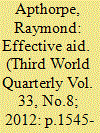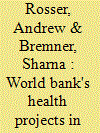| Srl | Item |
| 1 |
ID:
116864


|
|
|
|
|
| Publication |
2012.
|
| Summary/Abstract |
International aid workers are invisible in the absence of data as to who cleaves to what knowledges and practices about how aid works to be effective. When it is similar or different best practice positions that are taken is another unknown, despite what this could tell us about aid effectiveness. This paper identifies through their everyday poetics two of the angles on 'how aid works' that aid workers take. One angle displays a programmatic, or 'like clockwork' aesthetic about how aid is said to 'work' through causal mechanisms, provided only that the right policy and 'the tools we have' are put in place and implemented. The other, a 'like an artwork' aesthetic, puts constitutive institutions and new interpretative understandings to the fore. The aid effectiveness issues and reforms associated with the 2005 Paris Declaration on Aid Effectiveness and subsequent meetings, the latest in Busan in 2011, do not address many, if any, of the issues raised in this paper. They should.
|
|
|
|
|
|
|
|
|
|
|
|
|
|
|
|
| 2 |
ID:
140718


|
|
|
|
|
| Summary/Abstract |
The World Bank's health sector projects in Timor-Leste have been among the few operations it has funded in that country that have achieved any sort of positive results. This paper examines the factors underpinning their relative success and considers the wider lessons for the delivery of effective aid in the context of peace-building operations in fragile contexts. We argue that political economy factors played an important role in shaping the relative success of these projects, extending and revising an earlier analysis by Rosser. In terms of wider lessons, we argue for a more political understanding of the determinants of aid effectiveness. Specifically we suggest that aid effectiveness needs to be seen as a function not just of the technical quality of project design and the administrative competence of project managers but also the extent to which there is congruence between donor and local elites’ agendas.
|
|
|
|
|
|
|
|
|
|
|
|
|
|
|
|